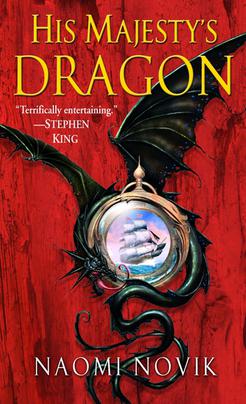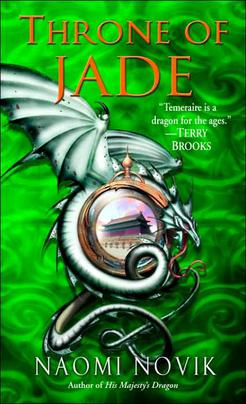Once again, I must apologize for the long drought of posts. The leisure time I used to devote to Sarcasmancy has gone towards weekly entertainment reviews for The Technique. There is also less leisure time to go around. Graduate school is hard work, but it is unlike a job in that you are never off the clock. There is this implicit pressure to be constantly refining your bullshit, or researching for your thesis, or practicing the skills that you have supposedly mastered after two one-hour lab sessions. At least that’s been my experience of it. But you didn’t come here for whining and excuses. No, I imagine you want commentary, witticisms and what passes for insight on nerd-friendly fiction. I’m rusty, but I will do my best to satisfy.
Busy as I’ve been, I managed to read a lot quality modern fantasy throughout the past two semesters. After wrapping up Strange & Norrell and The Road, I devoured Naomi Novak’s Temeraire series (up to Tongues of Serpents). Like all good alternate-history fiction, the series centers on a simple but potent hypothetical: What if the Napoleonic Wars were fought with dragons? More specifically, what if the French and the Brits had aerial corps where soldiers rode dragons like bombers, with nothing but courage and leather straps keeping them on board?
Dragon is a tricky meat to prepare. It is the chicken of fantasy writing. There are a billion and one different ways to cook and serve it, but everyone has had it so often that they think they’ve had them all before. You have got to serve it up with something savory and exotic for it to really sink in and stand out. Primitive gun powder is just such a seasoning. It obliterates the familiar dynamic of knights in shining armor and maidens fair, and gives mankind a weapon that can match—but not yet easily over-power— flying fire-breathing serpents with armored scales.
“Yes, yes,” you say, haughty and impatient “but what of the writing?!” Naomi Novak is a strong author. Her language is faithful to the period, but much plainer and more readily readable than Strange and Norrell. Her main strength is making these big, fanciful creatures feel plausible and conceptually tangible. Usually dragons are beings of incredible, ludicrous power, or fairly straightforward monsters in need of a good slaying, and in either case they are loosely defined creatures filled-in with amorphous magic. Novak presents readers with several discrete classes of dragons with several different yet distinctive abilities. Yes, some of them can breathe fire or spit acid, but they can also bleed and tire and get sick and hungry. In fact, Novak’s dragons’ most fanciful ability is their capacity for human speech.
The implications of an animal that can coherently speak a human language are huge, and fortunately, they are not lost on Novak. While the intelligence of dragons varies greatly from breed to breed, they are generally quite intelligent and the series seriously grapples with issues of draconic rights. The series’ titular dragon is particularly bright and extremely passionate about bettering the social station of his race. The captains and admiralty often jokingly refer to Temeraire as “that Jacobin dragon,” and accuse him of fomenting radical sentiments amongst the British Aerial Corps.
Then again, the Corps is quite radical for the time itself. Certain breeds of dragons conveniently demand female captains, giving Novak an excellent pretense to include strong-willed independent women in her Napoleonic period piece. Much of the first book deals with Captain William Lawrence’s uneasy transition from the stiff regulations of the Navy to the atypical informality of the Corps.
The high point of the series.
Even though the series is primarily focused on the Napoleonic wars, it spends a surprisingly small proportion of time in England and Fance. The second book sees Lawrence and Temeraire off to China, and the third book details their return through West Asia and Eastern Europe, only for the fourth book to pack them off to Africa. The fifth book is a something of a treat as it brings the series back home and features battles fought in occupied Britain, but then book six takes place in Australia. The globe-trot is a mixed bag. I think Throne of Jade’s trip to China was brilliant and perhaps the high point of the series, using the radically different dynamic between humans and dragons to emphasize the real-world cultural differences between Britain and the east. Black Powder War’s whirlwind tour of Turkey and Prussia felt rushed and ill-defined however. Empire of Ivory is even worse as it manages to make Africa seem blandly primitive by focusing on the evils of slavery, and introducing a number of characters who simply die off without making any kind of significant impact. These grievances aired, I have to give Novak props for finding a formula that makes each book different and shows off her world-building talents in the process.
The books lend themselves to quick reading, so you may want to pick up
the Omnibus like I did.
If you are a fantasy fan who also enjoys action packed period pieces like Horatio Hornblower and Master & Commander, this series was written for you. I also suspect that my fellow gamers will get a lot of mileage out of this series. Naomi Novak worked on Neverwinter Nights, and her fight sequences and varied classes of dragons are clearly informed by RPG conventions. Long story short, if you like the sorts of things I write about on this blog, you’ll want to give His Majesty’s Dragon a try.



